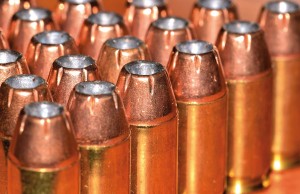Ammunition purchases should be tracked, Louisiana state senator says
17th December 2018 · 0 Comments
By Susan Buchanan
Contributing Writer
If they want it, residents of greater New Orleans have little trouble getting their hands on ammunition legally. “You can buy it at Walmart and at big sporting goods stores here,” Democratic state Senator Troy Carter of District 7 said last week. “It’s easier to buy ammunition in Louisiana than a gun.” California and several other states are placing restrictions on bullet sales, however.
Louisiana’s Senate District 7, with an African American majority, covers most of Algiers in Orleans; much of Gretna, Harvey and Woodmere in Jefferson Parish; and an area in and around Belle Chasse in Plaquemines Parish.
Carter earlier this year sponsored Senate Bill 383 to allow Louisiana’s state police to track ammunition sales. “I was very enthusiastic about this bill but it was shot down by National Rifle Association lobbyists,” he said. “If we could track ammunition purchases, red flags would go up and that would help to prevent mass shootings and other killings.” A tracking system could reduce gun use by gang members.
Louisiana had the highest murder rate in the nation last year, followed by Missouri, according to the Federal Bureau of Investigation in September.
Carter said policies governing pharmacies could be applied to ammunition vendors. Under federal law, customers must show photo IDs to buy decongestants containing Pseudoephedrine – used to make the street drug crystal meth. Pharmacies keep sales records of products containing PSE, including buyers, quantities and dates. “If someone visits several Walgreens and buys a lot of Sudafed over a short period of time, the authorities see it,” Carter said. “They can act on that information.”
Carter said online ammunition purchases are quick and easy in Louisiana. “You can buy it online and have it delivered to your doorstep in days,” he said. “A teenager can use a store gift card or their parents’ credit card, purchase ammunition on the internet and have it delivered.”
Walmart, based in Arkansas, doesn’t sell ammunition or firearms online, and does sell them in select stores only, company spokesman Ravi Jariwala said last week, without going into detail. Dick’s Sporting Goods, another national chain, sells ammo online and in stores. Dick’s Pennsylvania headquarters declined to comment on its policies last week.
California has taken the lead nationally in restricting ammunition sales. Under Proposition 63, approved by voters in 2016, the state’s ammo buyers face some obstacles now, with more in place next summer, to prevent shootings.
Sellers aren’t happy about California’s stricter regime. “The main part of the new laws goes into effect in July 2019, when someone who wants to buy ammo must have a background check and pay a fee before we can sell it to them,” said Dan Kash, president of LAX Firing Range Inc. in California. His company owns LAX Ammo LLC. “We as business owners will have to record their ammunition purchases.”
Kash said, “currently under new laws in California, we can’t display ammo in the open. Our employees must have background checks to sell it, and we pay for this, along with putting the ammo behind cabinet doors or barriers, where we retrieve it for our customers.”
These requirements create expenses for businesses. “And there’s nothing beneficial about the new rules for law abiding citizens,” Kash said. “Buying ammunition will be more costly and time consuming for them.”
In Louisiana, buyers comply with U.S. ammunition laws, and the state has some regulations of its own.
“If a person is federally prohibited from possessing a firearm, they’re also federally prohibited from possessing ammunition,” Kevin Moran, New Orleans-based spokesman and supervisory special agent with the Bureau of Alcohol, Tobacco, Firearms and Explosives, said last week. “Examples include a convicted felon or someone convicted of a misdemeanor crime of domestic violence.” ATF is an agency within the U.S. Department of Justice.
Moran said the nation’s Gun Control Act of 1968 prohibits the import, manufacture and distribution of ammunition that can penetrate a bulletproof vest when fired from a handgun. A federal exemption exists if this armor-piercing ammunition is intended mainly for sporting purposes.
Louisiana prohibits anyone from selling or transferring ammunition to someone known to have been convicted of a felony. State law restricts sales of armor-piercing bullets, with sports-related exceptions. Louisiana doesn’t require ammunition sellers to be licensed or to keep detailed records of purchasers. And the state doesn’t prevent someone it prohibits from owning a firearm from possessing ammunition, though federal restrictions may apply.
Senator Carter, who served on the New Orleans City Council for eight years, said he plans to introduce his ammunition bill again and believes it will be well supported in the Crescent City.
In an annual Quality of Life Survey released in November, the University of New Orleans found that crime remains the top concern among local voters, with a quarter of Orleans residents reporting that they hear gunfire a few times a month or more.
Last year, New Orleans and Baton Rouge had the nation’s fourth- and fifth-highest urban murder rates, respectively, with St. Louis first and Baltimore and Detroit next, according to the FBI.
This article originally published in the December 17, 2018 print edition of The Louisiana Weekly newspaper.



